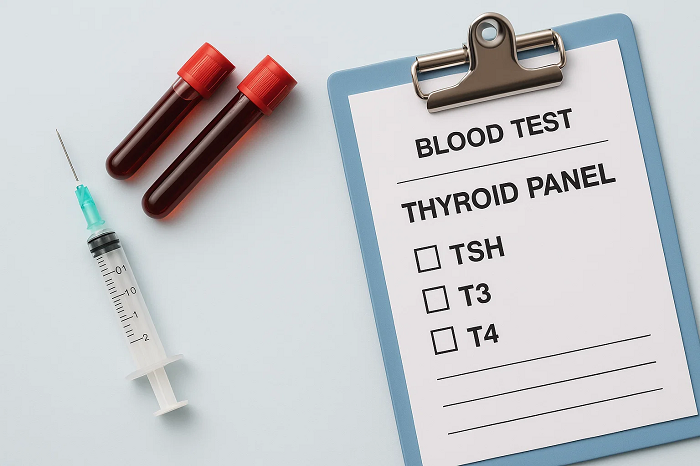
Thyroid Tests: Understanding TSH, Total T3 & Total T4 Levels
Your thyroid may be small, but it plays a big role in keeping your body running smoothly. Located at the base of your neck, the thyroid gland produces hormones that regulate metabolism, energy levels, heart function, and much more. If you`re feeling fatigued, gaining or losing weight unexpectedly, or experiencing mood swings, your doctor may recommend thyroid testing. Let’s break down the three most common thyroid function tests: TSH, Total T3, and Total T4.
1. Thyroid Stimulating Hormone (TSH)
What is it?
TSH is a hormone produced by the pituitary gland that controls how much thyroid hormone your thyroid produces. Think of it as the thermostat for your thyroid gland.
Why is it tested?
A TSH test helps evaluate overall thyroid function. It’s typically the first test done to detect thyroid dysfunction.
What high or low TSH means:
- High TSH: May indicate hypothyroidism (underactive thyroid) – your thyroid isn’t making enough hormones.
- Low TSH: May indicate hyperthyroidism (overactive thyroid) – your thyroid is producing too much hormone.
2. Total Thyroxine (Total T4)
What is it?
Total T4 measures the total amount of thyroxine in the blood, including both free (active) and bound (inactive) forms. T4 is a key hormone made by the thyroid that helps regulate metabolism.
Why is it tested?
T4 levels give a clearer picture of thyroid hormone production, especially when TSH is abnormal.
Normal range:
- Approximately 4.5 – 12.5 µg/dL
Interpretation:
- High T4: Can indicate hyperthyroidism
- Low T4: Can indicate hypothyroidism
3. Total Triiodothyronine (Total T3)
What is it?
T3 is the more active thyroid hormone, converted from T4 in the body. Total T3 includes both free and bound forms.
Why is it tested?
T3 testing is particularly useful when hyperthyroidism is suspected, especially if TSH and T4 results are inconclusive.
Normal range:
Interpretation:
- High T3: Suggests hyperthyroidism
- Low T3: Less commonly used to diagnose hypothyroidism, but may be low in some cases
When Should You Get a Thyroid Test?
Your doctor may recommend a thyroid panel if you`re experiencing:
- Fatigue or low energy
- Unexplained weight changes
- Depression or anxiety
- Irregular heart rate
- Hair thinning or dry skin
- Menstrual irregularities
These symptoms could signal an imbalance in thyroid hormones.
How to Prepare for a Thyroid Test
- Typically, no special preparation is required.
- Inform your doctor about any medications or supplements, as some can affect thyroid levels.
- Tests are done via a simple blood sample.
Understanding your thyroid test results—TSH, Total T4, and Total T3—can help you and your healthcare provider manage or diagnose thyroid conditions effectively. Early detection is key to maintaining a healthy metabolism and overall well-being. If you suspect a thyroid problem, don’t wait. Book a
thyroid test today and take control of your health.